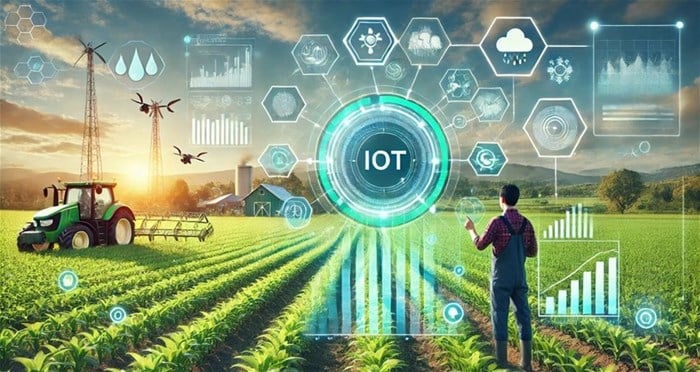Smart Agriculture in Africa: Technology-Driven Farming for Food Security
As Africa’s population approaches 2.5 billion by 2050, the continent faces massive pressure on food production and arable land. To meet this growing demand, countries are shifting from traditional farming to smart agriculture—a modern, technology-based approach that improves yields, reduces waste, and supports food security in Africa.

What is Smart Agriculture?
Smart agriculture uses innovations like AI, IoT sensors, drones, big data, and mobile apps to help farmers produce more with fewer resources. It helps farmers make better decisions by using real-time data on weather, soil, crop health, and market prices.
How Smart Agriculture Improves Food Security in Africa
Smart farming tools tackle the major challenges of African agriculture: rainfall dependence, low mechanization, and lack of data. With the help of scalable digital tools, farmers receive timely alerts, personalized recommendations, and automated systems that increase yields.
Technology Driving Smart Farming in Africa
- IoT and Remote Sensing
IoT devices collect accurate data on soil moisture, temperature, and humidity. This allows farmers to irrigate only when needed, saving water and improving plant health.2. Artificial Intelligence (AI) & Machine Learning
AI models predict crop diseases, improve yield forecasts, and recommend suitable crops based on soil type. Apps using AI provide farmers with instant advice tailored to their farms.3. Drones & Precision Aerial Imaging
Drones equipped with cameras and NDVI sensors help farmers detect crop stress, plan spraying, and create detailed farm maps. This reduces pesticide use and improves resource efficiency.4. Mobile & Digital Platforms
Mobile platforms like iShamba (Kenya), Esoko (Ghana), and AgroCenta (Nigeria) offer farmers real-time advisory services, market prices, and weather alerts — directly on their phones.
Benefits of Smart Agriculture for African Farmers
Higher crop yields → Increased income
Better resource use → Water and fertilizer saved
Risk reduction → Early warning systems
Access to finance → Digital payments, crop insurance
Youth empowerment → Agritech startups, drone operators
Challenges Slowing Adoption
Despite its potential, adoption is still low due to:
– Poor internet access in rural areas
– High initial cost of smart tools
– Limited digital literacy among farmers
– Lack of supportive national policies
Real-Life Success Stories Across Africa
Kenya: Platforms like Twiga Foods and UjuziKilimo help farmers analyze soil and sell produce directly to the market.
Nigeria: Hello Tractor allows farmers to rent tractors via SMS, widely known as the “Uber for tractors.”
South Africa: Commercial farms use precision irrigation and drone mapping to boost productivity in vineyards and orchards.
Ghana: Esoko and Farmerline provide digital advisory services to over 350,000 farmers.
How to Scale Smart Agriculture in Africa
To accelerate growth, governments and private sector stakeholders must:
– Invest in rural connectivity and digital infrastructure
– Offer financing, subsidies, and tech leasing programs
– Integrate smart agriculture in academic and vocational training
– Encourage open-data platforms for better decision-making
– Support agritech startups via PPPs and grants
Conclusion: A Pathway Toward Sustainable Food Security
Smart agriculture is Africa’s opportunity to leapfrog into a resilient, food-secure future. By empowering farmers with data and digital tools, the continent can overcome climate challenges, create jobs, and drive economic growth.



Leave a Reply